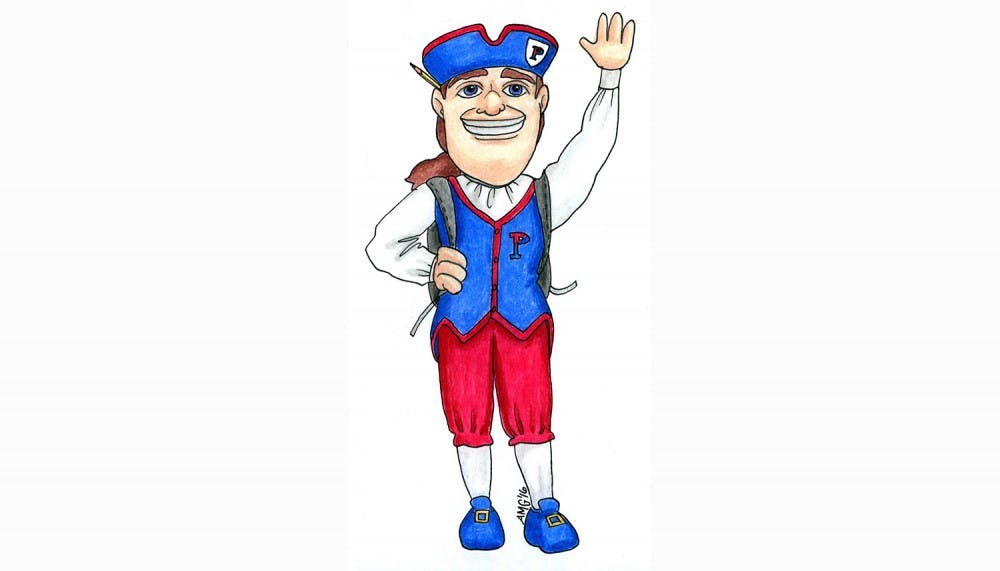The half–time horn blares, and I step away from the crowd. I’ve just finished posing for pictures with Amy Gutmann, a trustee or two and a cluster of wealthy donors. All day, I’ve fought off hordes of children, parents and students, all jostling in front of each other to get a photo with me. But as I walk back to the locker room where I peel off the Quaker mascot costume, I feel incredibly lonely.
On game days, I disappear from my midterms, essays and books to live a double life that the majority of my friends don’t even know exists. I trade pens and papers for a suit made up of white long johns, heavy shoulder padding, a button down shirt, red pants and a giant blue vest emblazoned with the famous split P. Next come my hands—I lose a finger (my alter–ego only has four) by stuffing my pinky with my ring finger. Lastly, I put on the giant head that reeks of sweat and feels like a sauna. My peripheral vision nearly disappears. I have to peer through the Quaker’s grinning mouth to see where I’m going.
Some days when I put on the suit, I’m just not feeling it—I’m stressed or I’m feeling dead from going out the night before. Other days, I’m as excited as the rest of the Palestra’s screaming fans, ready to give the away team a nice, big L for their ride home. Regardless of how I feel, as soon as my hands morph into the beefy fingers of our mascot, I lose myself. I become the guy at the party with all the confidence; I approach random spectators, steal their hats, make them laugh and cheer for the Red and Blue. I perform silly little dances for hundreds of people to the songs of the Penn Band. I mock their drum majors, embarrass the cheerleaders and distract our opponents. I reflect the calm, care–free moments we’ll want to remember when we look back at Penn—the late nights chilling with friends, walks through Penn Park in the April sun, the pure happiness when the people you care about surround you in bouncy castles during Fling. I try to ingrain that spirit in my performance.
Being the Quaker has become integral to my life at Penn. I didn’t exactly come into college with a burning desire to be a mascot; what I really wanted to do was belong. I visited Penn after I was accepted to watch a basketball game, and I was amazed by the Palestra. I wasn’t a sports fanatic, but even I knew that the Palestra used to be home to the Big Five and was often called The Cathedral of College Basketball. I was with a group of other newly accepted students, and Admissions had us writing these silly signs that start with “At Penn, I will…” People were coming up with all these creative statements, but all I had was “study engineering.” Not exactly a game changer. All of a sudden, the giant, lovable, slightly creepy Penn Quaker jumped into the room and everyone rushed to get a photo with him. In the crowd with my sign, I quickly scratched out my boring declaration and wrote “be the Quaker.” I took my picture, and, laughing with my new friends, we went on to the game. For the rest of the night, my dream of becoming the Quaker was the talk of the group, and I finally felt like I had a place to come to after high school.
Fast forward a few months, as I walked down the Activities Fair my first few days, I was handed a flyer that said “BE THE QUAKER.” I thought back to my pre–frosh activity and emailed quakertryouts@gmail.com (Shameless plug: We’re looking for a few more Quakers!). Before tryouts even began, the current mascots discussed the importance of secrecy and tradition with the Quaker. We were told that their identities could never be revealed. If we were selected to join, no one would be allowed to know until our senior year when we were “unmasked.” The importance of this secrecy was to maintain a level of normality between Quakers; we gain and lose people on a year to year basis, and we don’t want to lose a high standard of performance. There isn’t supposed to be a person in the Quaker—he is a single entity. Our secrecy helps maintain that singularity and continue a common thread; it's a tradition that's gone on for 30 years. Alumni ten years out can interact with the Quaker in the same manner that they did as underclassmen. At the end of the day, our secrecy is a pledge to keeping the spirit of Penn sacred. And sure enough, on September 20 of my freshman year, I was able to make that same pledge.
Mascotting is a weird, hectic, crazy experience. I've become close friends with the other Quakers; they're the only ones who understand why I'd volunteer, once or twice a week, to stuff myself in that costume and represent the Red and Blue for free. I don’t always love Penn—but even when I’m not entirely happy with our school, I have to stay constantly enthusiastic when I’m in that suit. In those hours, I’m perpetually sought–after. I’m the center of everyone’s attention, the focus of a room. I’m so much more than myself.
And then I take off the costume, and it all disappears.

